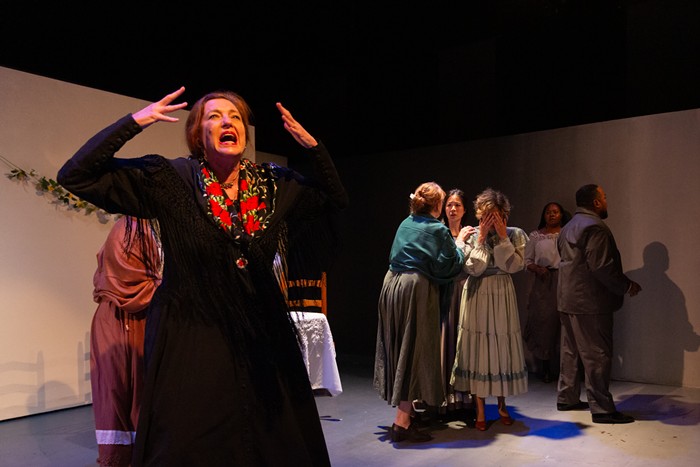by Aniko Szûcs
This weekend marks your last chance to see Portland Center Stage's production of The Merchant of Venice, directed by Róbert Alföldi. With graphic nudity, explicit implied-sex scenes, and a multimedia explosion of music, digital cameras, and giant screen projections, it's a show that's sent Shakespeare traditionalists into tailspins. But whether one sees the young Hungarian's vision (he's only 36!) as a brilliant contemporary update of a notoriously difficult dramatic text, or as just another abuse of the general populace's increasing need for bright lights and shiny objects in entertainment, the fact remains that this play will affect you deeply. What's more, Alföldi brought it here after a six-year run in Hungary, and mounted it without knowing a lick of English. To get this interview with him, I had to send my questions by email to PCS, which then sent them to a translator in Washington D.C., who interpreted them and sent them to Hungary, where the theatrical superstar is in the midst of already working on another production. Oh, this modern world...
Mercury: Your production of Merchant seems "American," with music by Eminem, and the digital cameras and all--but it's been playing in Hungary for years. What changes, if any, did you make to the original show in order to bring it to the States? To make it more "American?"
Alföldi: I think the so-called "American Culture" is more of a world culture these days. I did not have to change many things. Unfortunately, with a show like this you just cannot forget about what happened in NYC on 9/11. But it's been one of my greatest experiences that here in Europe, as well as in the States, we are concerned about the same exact questions. We live in the same difficult world.
Obviously, compared to more traditional Shakespeare productions, your Merchant contains scenes that could be quite shocking (male nudity, kicking the crap out of Shylock, fornicating on a desk, etc.). Did you set out to shock people?
Being shocking as an artistic aim does not exist. The intention is to articulate yourself precisely and to react to real, actual, and existing questions and pains. Why be polite? What is the sense of theater then? You have to articulate in extreme ways in order to make sure the audience cannot hide from, or avoid the given problem of the show.
Have you experienced any backlash from traditionalists regarding the production? I imagine some uppity-ups must say your interpretation is all shock value, and cheapens the source material.
There are certainly people who represent this opinion, but it was this show that brought out this anger from them, which means it was not a boring evening with a good dinner. They awoken and they debated and talked both about the show and the problem. Unfortunately [people] often mix up literature and theater. Shakespeare means different [things] as a piece of world literature and as living theater material. The question, "How should one do Shakespeare?" does not exist in theater. It is only good performance that exists, which is coherent and thorough, and bad performance, which is empty.
It seems like it would be difficult to work on ANY play with a cast and crew who speaks an entirely different language, let alone Shakespeare, who uses some of the most eloquent, difficult English imaginable. How did you know your ideas were being interpreted correctly?
I know [the cast and crew] understands me if I see exactly what I was asking for. If I don't see what I'm asking for, they don't. Actually, this work [with a translator, on a play] is much simpler than one would think.
What was it like to collaborate with American actors?
There is a certain aristocratic attitude in Hungarian actors that slows down the work so much. My American actors all worked with an incredible openness, attention, and humility. It was very easy and fast to proceed with them. I really began to like them, and I think they have become my friends. It is a very painful feeling that I don't know when I will ever meet them again.
Is this the most challenging work you've done?
Each work carries the same challenge, because it does not matter what kind of success you had before. Each new show always raises the same question: Can you articulate yourself in an interesting and understandable way? And this was a special case, of course, because we have a lot of wrong beliefs in Europe about American people--just as it is the other way around. I thought we were living in a different world and saw the basic questions in a different way. This was my biggest fear: whether [Americans] would understand me. But they did, and this was a great surprise and joy.
You've directed other classic works, including Shakespeare and Chekhov. Do you find your interpretations usually lean towards extreme modernism with potentially offensive scenes, or is Merchant a bit of a departure for you?
I live today, in this world. I don't know how they lived five or six hundred years ago, and frankly, I'm not interested. Theater is not a museum, theater is living and breathing art that only exists in the moment it is born. Why would I be interested in how they staged something in the past? On the other hand, the classical plays are the most amazing stories, but we approach them with this incredible and fake respect. I dedicated my life to showing that these are contemporary stories. So in the general and superficial sense of the expression, I always approach these plays in a "modern" way. And it is possible that not everybody will like it, but it gives to many people an experience like, "Oh my God, these are not just strange and boring texts that we have to read to be well-educated. They are about me."
Your production of Merchant is very dark, and it is very difficult to like any of its characters. Seeing it I felt my hope for the future of humanity being sucked out of me (thought it was also quite riveting, just depressing). Were you trying to create a sense of hopelessness, or do you think this production has moments of optimism?
It is the artist's task to express himself in an extreme way, to work with strong effects to force the audience to think about where we would get if we continued on as we are. In this way, I think that the show is optimistic. Not much, but a little.
Did you experience any resistance with the re-creation of this production in America? Did the good folks at Portland Center Stage ever have to say, "Sorry, Robert, that's just going too far?"
I did not experience any kind of resistance. They trusted me from the first moment till the last. We talked a lot, and had a curiosity, and love towards each other. I have arrived back [in Hungary] with this huge energy.
What play do you hope to direct next? Do you think you could ever direct a classical play "normally?"
Next time I'll direct the Verdi opera, Troubador. But I do think I directed the Merchant in a normal way. For me it was normal. And I hope for many others as well.
Merchant of Venice plays at the Newmark, 1111 SW Broadway, 274-6588, Thurs-Sat 8 pm, Sat-Sun 2 pm, through Feb. 1, $16-51


















